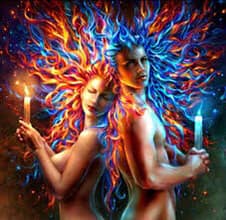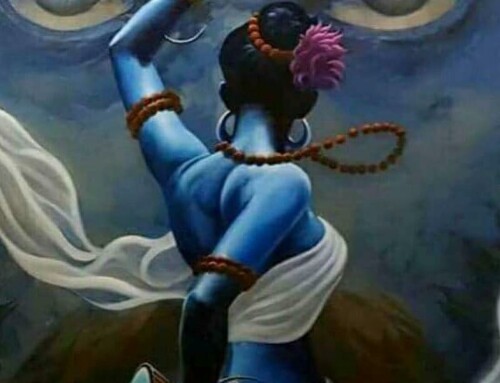
The word TANTRA has been interpreted differently. The syllable TAN in Sanskrit means TOTALITY, ENTITY – TRA, then denotes the tools to get there.
TANTRA is also translated with INTERWEAVE, UNITING.
The influence of Tantrism in India reached in the eleventh and twelfth century it’s peak. While all of Europe was waiting for the true life after death in the deepest Middle Ages, Tantrism in India celebrated the joys of this world and (sexual) ecstasy.
Later, Tantrism was introduced in Nepal, Tibet and China.
One of the oldest and most beautiful Tantric texts is the Vijnanabhairava Tantra. It contains the 112 advices Shiva gives to Shakti to achieve enlightenment.
Tantra is a universal initiation doctrine that has penetrated into every mystical tradition of Asia: the Hindu, Buddhist, Lamaist, Tibetan, Chinese, Japanese and even mystical traditions of Greece (that is why I live here – because Greece is the only country in Europe, into which Tantrism has spread in antiquity 😉…). It even shows a similarity with the Jewish Kabbalah.
The human being is, according to tantric tradition, a microcosm in the macrocosm. Everything that exists in the cosmos is repeated in every individual, governed by the same principles and laws that govern the universe. We are, therefore, “images of God” and the energy of God is in us and in all things. The increasing awakening of consciousness is nothing else but the self-knowledge of our divinity. “The Spirit that is in us, and the Spirit that is in the sun, is the same” say the ancient wisdom scriptures, so we are ALL- ONE, that means, we are one with the Cosmos and subject to the same divine intelligence.
This unity is symbolized in Tantrism by union of the spirit (pure consciousness) with the creative energy of the world. It is at the same time the union of Shiva, the male principle, symbolized by the Lingam, with the union of Shakti, the female principle, symbolized by the Yoni.
Originally, Paramashiva was an androgynous deity, portrayed as a woman and a man at the same time, the unchallenged universal energy combined with absolute consciousness, the cosmic spirit.
However, in order to be able to communicate with himself, he differentiated into Shiva (cosmic spirit) and Shakti (creative energy of life).
The union of Shiva and Shakti created the Cosmos. Then the incarnated consciousness distributes itself into matter, which leads to the difference of unity and separation. This incarnated creation seeks to reunite itself in the ever-renewed experience of the game of its simultaneously repulsive (-) and attractive (+) polarities.
Tantra is the royal path to this reunion.






